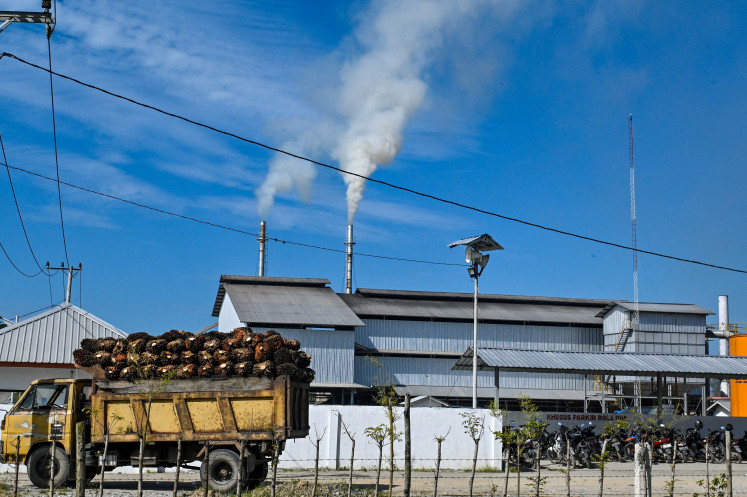Popular Reads
Top Results
Can't find what you're looking for?
View all search resultsPopular Reads
Top Results
Can't find what you're looking for?
View all search resultsGovt institutions say no to LGBT
Adding to the long list of prejudices faced by the lesbian, gay, bisexual and transgender (LGBT) community in Indonesia, some government institutions are refusing to recruit those they say exhibit “deviations” in sexual orientation and behavior
Change text size
Gift Premium Articles
to Anyone
Adding to the long list of prejudices faced by the lesbian, gay, bisexual and transgender (LGBT) community in Indonesia, some government institutions are refusing to recruit those they say exhibit “deviations” in sexual orientation and behavior.
November marks the opening of civil servant recruitment at 74 ministries and state agencies as well as 467 local administration offices across the county.
While millions are expected to compete for more than 190,000 vacant posts, requirements set by some institutions might force potential LGBT job seekers to think twice before applying.
From The Jakarta Post’s observations, at least two institutions have put forward a ban on LGBT applicants, namely the Trade Ministry and the Attorney General’s Office (AGO). Their job requirements can be seen in documents uploaded on the institutions’ respective official websites.
The Trade Ministry’s special requirement directly states that applicants “must not exhibit sexual orientation deviations” or “behavioral deviations”, with the latter referring to transgenderism.
The AGO’s special requirement even goes as far as categorizing homosexuality and transgenderism as mental illnesses: Applicants “must not be mentally disabled, including sexual orientation deviations and behavioral deviations”.
The requirement has raised eyebrows as the country’s Diagnostic Classification on Mental Disorder Guidelines (PPDGJ) III, issued in 1987, states that homosexuality is not a mental illness.
While the ban has sparked criticism, LGBT activists are not entirely surprised. The AGO previously came under fire for imposing the same exact requirement in its 2017 recruitment, but later said it would retract the policy following a protest note from the National Commission on Human Rights (Komnas HAM).
Komnas HAM said at the time that the policy was discriminatory and contradicted the 1945 Constitution, which guarantees every citizen the right to work in state institutions regardless of their sexual orientation or gender identity.
An AGO official who was then in charge of overseeing employee development, Yuni Daru, argued that the institution would need bold and assertive individuals as they would encounter cases like murder and corruption.
Two years later, a different line of reasoning was put forth by her successor, Teguh Wardoyo, who said the ban was made with the “simple consideration that the AGO wanted to obtain normal potential employees”.
“For now, there are still pros and cons about the issue among the public. […] To add, our existing positive laws and religious norms have not allowed deviations of sexual orientation and transgenderism,” he told the Post on Friday.
When asked what the institution meant by “normal” employees, Teguh refused to comment further.
He, however, gave assurances that the said special requirement was stipulated in a 2012 AGO regulation on employee procurement.
Administrative and Bureaucratic Reform Ministerial Regulation (Permenpan) No. 23/2019, he added, allowed institutions to impose additional requirements in accordance with the characteristics and needs of the job posts, so long as they did not change any requirements surrounding campus accreditation.
Trade Ministry spokesperson Olvy Andrianita said she would have to look into the matter with the ministry’s employment division before giving any immediate comment.
LGBT organization Arus Pelangi chairperson Ryan Korbarri said the ban on LGBT applicants was a form of state discrimination against LGBT people, especially with the use of the “deviation” term.
“LGBT people are Indonesian citizens who have the same rights to the job, so the requirement is the same as preventing them from accessing the job, even though they want to serve the country,” he said.
Ryan said there had been growing efforts to limit LGBT people from entering the workforce.
“It’s a common reality for LGBT people. Even when they already have a job, when their employers find out about their being in the LGBT community, they are faced with the employers’ attempts to remove them from the job,” he said, adding that the attempts ranged from employers intentionally trying to find faults in them and imposing salary cuts to terminating contracts.
A recent report by Arus Pelangi recorded 172 cases of persecution against LGBT people in nine provinces in the country between 2006 and 2017. The cases were further categorized into 17 forms of persecution, including three cases of alleged dismissal due to victims’ expression of gender or sexual orientation.
Other forms of persecution faced by the LGBT community in Indonesia, according to the report, were intimidation, abuse, maltreatment, molestation, personal data dissemination, raids, destruction of goods, rape, forced dispersion, non-procedural arrests, murders, detainment, extortion, obstacles in obtaining permits to hold events and corrective efforts.
Lini Zurlia, a vocal social media critic of the government and advocate of LGBT rights, said the ban was a violation of the LGBT people’s fundamental rights and a form of structural discrimination, given that the requirement was stipulated in state institutions’ regulations.
“There are many studies proving that homosexuality is not a mental illness. Even our PPDGJ has declared it as so since the 1990s. Our government agencies are not integrated and don't want to advance forward, so this is the result,” she said.










